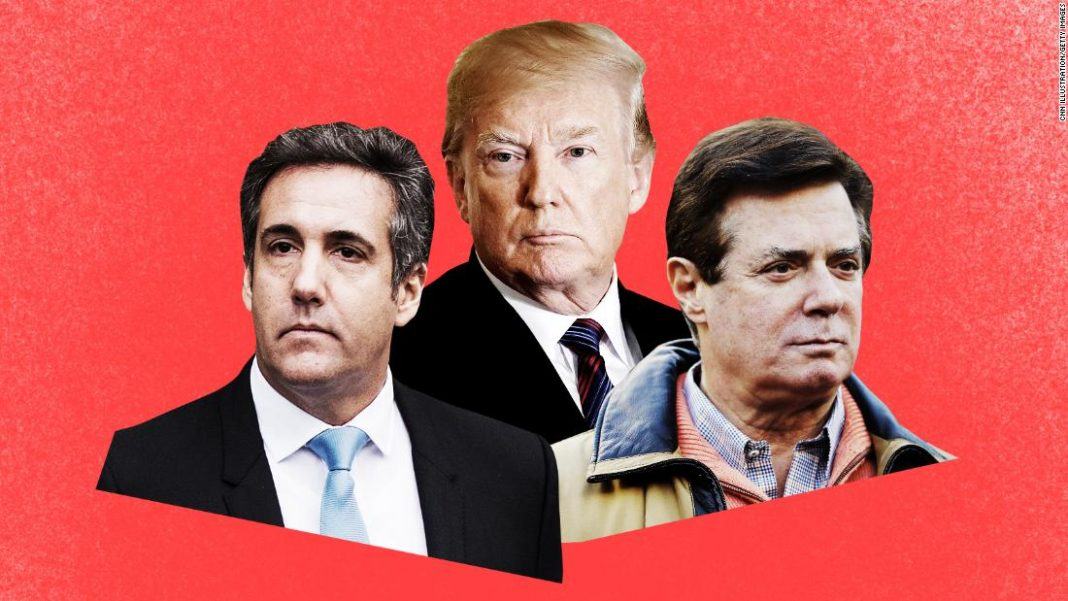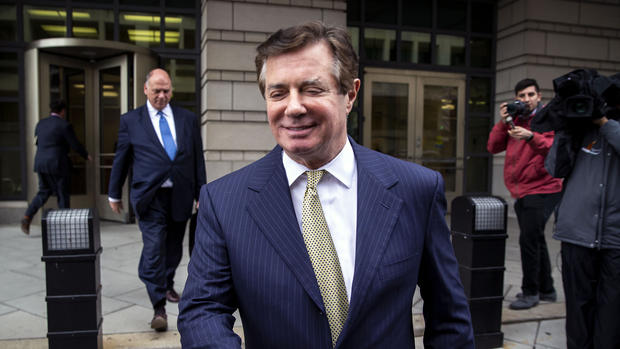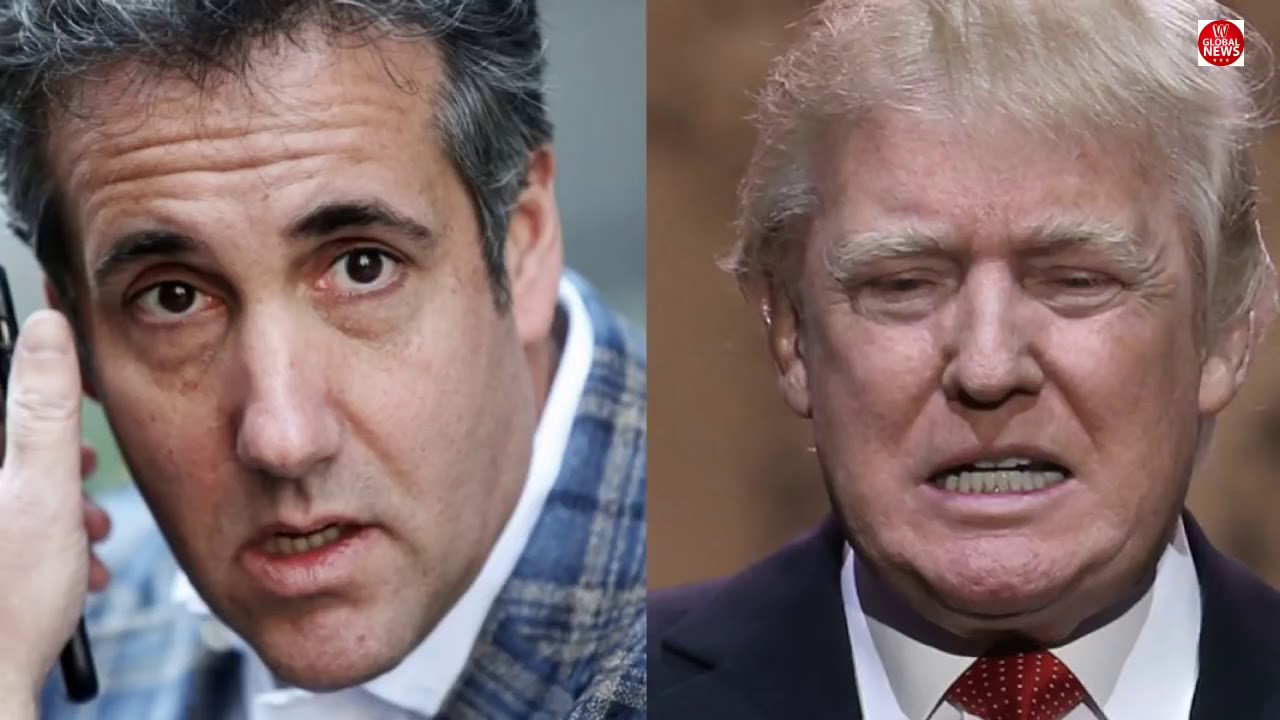
It comes as no surprise that Donald Trump was unable to contain himself Tuesday after his former campaign chairman Paul Manafort was found guilty on 8 counts while his former ‘fixer’ lawyer pleaded guilty to 8 counts. Cohen admitted to arranging payments for Stormy Daniels aka Stephanie Clifford and Karen McDougal under Trump’s direction.
This brings it up to five of his associates with the 2016 campaign pleading guilty or being found guilty including Rick Gates, Michael Flynn and George Papadopoulos.
Naturally, Republicans and supporters of the president are remaining quiet, but as his circle continues to be found guilty, his attacks on Mueller and the FBI will get louder.
Trump faced one of the most perilous moments of his presidency on Tuesday after two onetime members of his inner circle simultaneously faced the words “guilty.” The back-to-back legal blows in a pair of courtrooms in different states came as Trump tore into the prosecution as he headed to a rally with supporters in West Virginia.
Trump declared that the conviction of his former campaign chairman Paul Manafort on financial crimes was “a disgrace.”
But he largely ignored his former personal attorney Michael Cohen’s guilty pleas to felonies, including campaign finance violations that Cohen stated he carried out in coordination with Trump. The president did say he felt “badly for both” men.
Manafort was convicted Tuesday in Virginia on charges brought by special counsel Robert Mueller, who is investigating Russian interference in the 2016 election and potential obstruction of justice. Cohen pleaded guilty in New York, saying he and Trump had arranged the payment of hush money to porn star Stormy Daniels and a former Playboy model to influence the election.
Trump told reporters in West Virginia ahead of a rally that Manafort’s conviction “has nothing to do with Russian collusion.” Of Manafort’s crimes, he said, “It doesn’t involve me.”
But it is the Cohen case that places Trump in the most jeopardy, legal experts said, as Cohen acknowledged his role in a scheme to pay off women who accused the future president of sexual misconduct. Cohen pleaded guilty to two counts of campaign finance violations that he said he conducted in coordination with Trump.
Manafort’s conviction is a vindication of Mueller’s work as investigators continue to probe potential misdeeds by the president and those in his orbit. Mueller’s team also had referred evidence in the Cohen case to federal prosecutors in New York.
Trump attorney Rudy Giuliani sought to cast the blame solely on Cohen in a Tuesday statement, saying: “There is no allegation of any wrongdoing against the President in the government’s charges against Mr. Cohen.”

Paul Manafort, the longtime political operative who for months led Donald Trump’s successful presidential campaign, was found guilty of eight financial crimes Tuesday in the first trial victory of the special counsel investigation into the president’s associates.
A judge declared a mistrial on 10 other counts the jury could not agree on.
The verdict was part of a stunning one-two punch of bad news for the White House, coming as the president’s former lawyer, Michael Cohen, was pleading guilty in New York to campaign finance charges arising from hush money payments made to two women who say they had sexual relationships with Trump.
The jury returned the decision after deliberating four days on tax and bank fraud charges against Manafort, who led Trump’s election effort during a crucial stretch of 2016, including as he clinched the Republican nomination and during the party’s convention.
Manafort, who appeared jovial earlier in the day amid signs the jury was struggling in its deliberations, focused intently on the jury as the clerk read off the charges. He stared down blankly at the defense table, then looked up, expressionless, as the judge finished thanking the jury.
“Mr. Manafort is disappointed of not getting acquittals all the way through or a complete hung jury on all counts,” said defense lawyer Kevin Downing. He said Manafort was evaluating all his options.
The jury found Manafort guilty of five counts of filing false tax returns on tens of millions of dollars in Ukrainian political consulting income. He was also convicted of failing to report foreign bank accounts in 2012 and of two bank fraud charges that accused him of lying to obtain millions of dollars in loans after his consulting income dried up.
The jury couldn’t reach a verdict on three other foreign bank account charges, and the remaining bank fraud and conspiracy counts.
The outcome, though not the across-the-board guilty verdicts prosecutors sought, almost certainly guarantees years of prison for Manafort. It also appears to vindicate the ability of special counsel Robert Mueller’s team to secure convictions from a jury of average citizens despite months of partisan attacks, including from Trump, on the investigation’s integrity.
The verdict also raised immediate questions of whether the president would seek to pardon Manafort, the lone American charged by Mueller to opt for trial instead of cooperate. The president has not revealed his thinking but spoke sympathetically throughout the trial of his onetime aide, at one point suggesting he had been treated worse than gangster Al Capone.
The president Tuesday called the outcome a “disgrace” and said the case “has nothing to do with Russia collusion.”
The trial did not resolve the central question behind Mueller’s investigation — whether Trump associates coordinated with Russia to influence the election. Still, there were occasional references to Manafort’s work on the campaign, including emails showing him lobbying Trump’s son-in-law Jared Kushner on behalf of a banker who approved $16 million in loans because he wanted a job in the Trump administration.
Manafort urged Kushner to consider the banker, Stephen Calk, for Secretary of the Army. Though Kushner responded to Manafort’s email by saying, “On it!” Calk ultimately did not get an administration post.
For the most part, jurors heard detailed and sometimes tedious testimony about Manafort’s finances and what prosecutors allege was a years-long tax-evasion and fraud scheme.
Manafort decided not to put on any witnesses or testify himself. His attorneys said he made the decision because he didn’t believe the government had met its burden of proof.
His defense team attempted to make the case about the credibility of longtime Manafort protege Rick Gates, attacking the government’s star witness as a liar, embezzler, and instigator of any crimes as they tried to convince jurors that Manafort didn’t willfully violate the law.
Gates spent three days on the stand, telling jurors how he committed crimes alongside Manafort for years. He admitted to doctoring documents, falsifying information and creating fake loans to lower his former boss’ tax bill, and also acknowledged stealing hundreds of thousands of dollars without Manafort’s knowledge by filing fake expense reports.
Beyond the testimony, prosecutors used emails and other documents to try to prove that Manafort concealed from the IRS, in offshore accounts, millions of dollars in Ukrainian political consulting feeds. Overall, they said, he avoided paying more than $16 million in taxes.
Central to the government’s case were depictions of an opulent lifestyle, including a $15,000 ostrich jacket, luxury suits and elaborate real estate that prosecutors say was funded through offshore wire transfers from shell companies in Cyprus and elsewhere.
U.S. District Judge T.S. Ellis III repeatedly grew impatient with prosecutors as they sought to demonstrate Manafort’s garish tendencies. The clashes between the judge and the prosecutor became a sideshow of sorts during the weeks-long trial, with the judge at one point appearing to acknowledge that he had erroneously scolded them.
After the trial, Ellis complimented lawyers on both sides for “zealous and effective representation.” He also remarked on his surprise at the level of attention the case has received and the criticism he received for his management of the trial.
“We all take brickbats in life,” Ellis said.
The trial in Alexandria, Virginia, is the first of two for Manafort. He faces a trial later this year in the District of Columbia on charges of conspiracy against the United States, conspiracy to launder money, making false statements and acting as an unregistered foreign agent for Ukrainian interests. He is also accused of witness tampering in that case.

Michael Cohen, President Trump’s former personal lawyer and fixer, has pleaded guilty to eight counts in federal court in New York, federal prosecutors announced Tuesday evening.
They include five counts of tax evasion, one count of falsifying submissions to a bank and two counts involving unlawful campaign contributions.
Cohen’s conduct “reflects a pattern of lies and dishonesty over a significant period of time,” said Robert Khuzami, deputy U.S. attorney for the Southern District of New York, outside the federal courthouse in Manhattan.
The counts related to campaign finance violations involved payments that were made to keep two women quiet during the campaign, Khuzami said, noting that Cohen was “repaid at the direction of the candidate.”
Khuzami noted that Cohen was repaid by the campaign with invoices for “services rendered.” Those “invoices were a sham,” Khuzami said. They were “merely reimbursement for illegal campaign contributions.”
With Cohen’s admission, he is implicating the president of the United States in what would be a major violation of campaign finance law. Trump admitted in May to reimbursing Cohen — after first denying any knowledge of at least one payment. But he noted that the reimbursement to Cohen had “nothing to do with the campaign.”
The blockbuster set of guilty pleas from Cohen comes on the same day Trump’s former campaign chairman Paul Manafort was found guilty by a jury in Virginia of eight federal counts as well. The twin events mark what could be a consequential day in the Trump presidency. Trump continues to face pressure from the special counsel investigation, led by Robert Mueller, into Russian interference in the 2016 campaign that was intended to help Trump win the presidency.
After the Manafort verdict, Trump again referred to the Mueller investigation as a “witch hunt.” But there are now seven people who have either pleaded to or been found guilty of charges stemming from the investigation. (Cohen’s case was prosecuted by the U.S. District Court for the Southern District of New York, but Mueller referred the case to that office.)
“There is no allegation of any wrongdoing against the President in the government’s charges against Mr. Cohen,” Rudy Giuliani, counsel to the president, contended in a written statement, despite the potential campaign finance violation. “It is clear that, as the prosecutor noted, Mr. Cohen’s actions reflect a pattern of lies and dishonesty over a significant period of time.”
Lanny Davis, Cohen’s attorney, had a different perspective.
“Michael Cohen took this step today so that his family can move on to the next chapter,” Davis said in a statement. “This is Michael fulfilling his promise made on July 2nd to put his family and country first and tell the truth about Donald Trump. Today he stood up and testified under oath that Donald Trump directed him to commit a crime by making payments to two women for the principal purpose of influencing an election. If those payments were a crime for Michael Cohen, then why wouldn’t they be a crime for Donald Trump?”
Cohen said in court that he made the excessive contributions in the summer of 2016 and in October 2016 — at the direction of a federal candidate. While Cohen did not name President Trump, it is clear that is who he is referring to given the timeline and circumstances.
One of the unlawful campaign contributions involved a corporation. Cohen said he and the CEO of a media company made a payment to stop an individual from releasing information damaging to a federal campaign in the summer of 2016.
While Cohen did not name them, this matches up with the circumstances around former Playboy model Karen McDougal, who settled a lawsuit with American Media Inc., the parent company of the National Enquirer. McDougal sued AMI for allegedly purchasing exclusive rights to her story for $150,000 in August 2016. McDougal says she had a 10-month affair with Trump a decade ago, which the White House has denied.
The other excessive contribution Cohen pleaded guilty to appears to be a payment to adult film star Stephanie Clifford, whose stage name is Stormy Daniels. Cohen said the payment was later repaid to him by the candidate. While he didn’t mention Trump, the president has acknowledged repaying Cohen for a $130,000 payment to Daniels to keep an alleged sexual relationship, which Trump denies, private.
“He worked to pay money to two women who he believed would be detrimental to the 2016 presidential campaign,” Khuzami said.
It was unclear what, if any, cooperation Cohen might offer as a result of Tuesday’s plea or what punishment he might finally face.
Cohen — who worked for Trump on a range of real estate, political and personal matters — knows as much as or more than anyone in the president’s inner circle.

